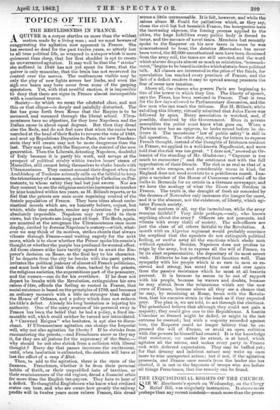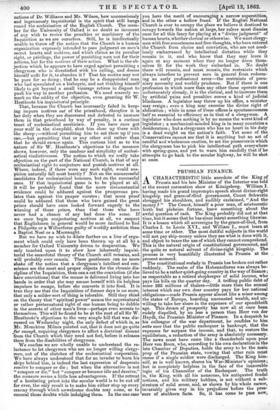THE INQUISITORIAL RIGHTS OF THE CHURCH. Q IR W. Heathcote's
speech on Wednesday, on the Clergy 1,..3 Relief Bill, was singularly instructive. It shows more perhaps than any recent incident—much more than the prose- cutions of Dr. Williams and Mr. Wilson, how unconsciously and ingenuously inquisitorial is the spirit that still bangs round the ecclesiastics of the English Church. The mem- ber for the University of Oxford is no doubt as innocent of any wish to revive the penalties or machinery of the Inquisition as we are ourselves. Still, he is intellectually unable to throw off the notion that the Church is a human organization expressly intended to pass judgment on men's secret hearts and motives, and which claims as its peculiar right, or privilege, the power of punishing men not for their actions, but for the motives of their action. What is the ob- jection which he appears to have urged against permitting a clergyman who is dissatisfied with his calling, and deems himself unfit for it, to abandon it ? That his motive may not be pure for so doing ; that he may be a disappointed man who had speculated on a bishopric, and not thinking himself likely to get beyond a small vicarage retires in disgust to push his way in another profession. We need scarcely re- mark on the oddity of the objection, even granting Sir W. Heathcote his inquisitorial principle.
That, because the Church has necessarily failed in keep- ing impure motives out of the priesthood, therefore it is her duty when they are discovered and defeated to immure them in that priesthood by way of penalty, is a curious tenet of ecclesiastical asceticism. If you have once got your wolf in the sheepfold, shut him close up there with the sheep ;—without permitting him to eat them up if you can,—but permitting that or any other evil rather than that he should escape again. This curious hint as to the nature of Sir W. Heathcote's objections to the measure shows, however, only the candour and simplicity of ecclesi- astical vindictiveness. The notion to which we really take objection on the part of the National Church, is that of any ecclesiastical right to conjecture and punish motives at all. Where, indeed, if there were any such right, would sus- picion naturally fall most heavily ? Not on the unsuccessful candidates for ecclesiastical honours, but on the successful ones. If that inquisitorial game is to be played at all, it will be probably found that far more circumstantial evidence could be adduced against the prosperous pre- lates than against the pauper curates ; that more proof could be adduced that those who have gained the great prizes should have once looked forward eagerly to the winning of those prizes, than that those who have never had a chance of any had done the same. If we once begin conjecturing motives at all, we suspect that Englishmen in general would be more inclined to find a Philpotts or a Wilberforce guilty of worldly ambition than a Baptist Noel or a Macnaught.
But we have no wish to dilate further on a line of argu- ment which could only have been thrown up at all by a member for Oxford University driven to desperation. We only touched upon it to show how inherently inquisi- torial the sacerdotal theory of the Church still remains, and will probably ever remain. These gentlemen can no more shake off the notion that a clergyman's intellect and con- science are the meet and proper objects for the chronic dis- cipline of the Inquisition, than can a cat the conviction (if she have convictions) that the mouse is delivered living into her hands in order that she may amuse herself with its helpless impulses to escape, before she converts it into food. It is true they see that the Inquisition of former days is no more, that only a milder sort of thing is tolerable. Still they think on the theory that " spiritual power" means the supernatural or rather preternatural right of one human being to dabble in the secrets of other men's lives—perhaps even secrets to themselves. This will be found to be at the root of all Sir W. .Heathcote's objections to the very simple bill that was dis- cussed on Wednesday night, the only defect of which is, as Mr. Monckton Mikes pointed out, that it does not go quite far enough, requiring clergymen to affect a doctrinal dissent from the Church which they need not feel, before it releases them from the disabilities of clergymen. We confess we are wholly unable to understand the re- luctance to let clergymen who are no longer willing clergy- men, out of the clutches of the ecclesiastical corporation. We have always understood that for an invader to burn his ships behind him, is indeed the last expression of desperate resolve to conquer or die ; but when the alternative is not " conquer or die," but " conquer or become idle and deceive," the measure seems a little less advantageous. If the retreat of a hesitating priest into the secular world is to be cut off for ever, the only result is to make him either atop up every cranny through which unwelcome doubts may come, or to conceal those doubts while indulging them. In the one case you have the merit of encouraging a narrow superstition, and in the other a hollow fraud. If the English National Church is ever to occupy the place we believe it destined to occupy towards the nation at large, her rulers must dismiss once for all this fancy for playing at a " divine judgment" of human hearts, whether clerical or otherwise. We want clergy- men with free consciences and free thoughts, who have entered the Church from choice and conviction, who are not need- lessly embarrassed by intellectual dictation while they remain in it, and who know that they may leave it again at any moment when they no longer deem them- selves fit for the work they embarked in. No doubt there will remain, and must remain, the restraints which always interfere to prevent men in general from redeem- ing an early professional error—the restraints of pecu- niary necessity and worldly prudence. But if there is one profession in which more than any other these operate most unfortunately already, it is the clerical, and to increase them by artificial pains and penalties seems a kind of judicial blindness. A legislator may throw up his office, a minister may resign ; even a king may exercise the divine right of abdication ; while in none of these offices is spontaneousness half so essential to efficiency as in that of a clergyman. A legislator who does nothing is by no means the worst kind of legislator ; a mechanical-minded king is in many countries a desideratum ; but a clergyman who has no heart in his duty is a dead weight on the nation's faith. Yet some of the Conservatives cannot see that it is anything but an act of needful and wholesome caution, to set the preserves in which the clergyman has to pick his intellectual path everywhere with spring-guns, and yet to warn him candidly that if he attempts to go back to the secular highway, he will be shot at once.































 Previous page
Previous page